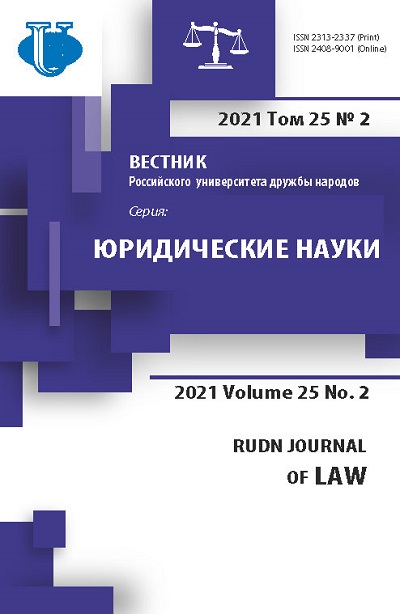The сoncept and types of factual communities in the modern theory of law
- Authors: Tsukanova E.Y.1
-
Affiliations:
- Belgorod National Research University
- Issue: Vol 25, No 2 (2021)
- Pages: 395-413
- Section: LEGAL RESEARCH METHODOLOGY
- URL: https://journals.rudn.ru/law/article/view/26706
- DOI: https://doi.org/10.22363/2313-2337-2021-25-2-395-413
Cite item
Full Text
Abstract
The article is devoted to the problems of formation and positioning of the category of “factual communities” in legal science. The relevance of this phenomenon in law is due to the need for a broader approach to the study of a set of factual circumstances that are the grounds for the emergence, change or termination of legal relations, which undoubtedly contributes to a more effective implementation of the goals of both lawmaking and law enforcement practice. The purpose of this article is to determine the prerequisites for the formation of the legal category under consideration, to identify the main types of factual communities, as well as to understand their functions. Achievement of this goal will make it possible with sufficient certainty to identify the main characteristics of the specified legal category, as well as to determine functional links with related legal concepts. The methodological basis of the article was made by modern achievements in the theory of knowledge. In the process of research, theoretical, general philosophical (dialectical, analysis, synthesis, deduction, systemic method), as well as traditional legal methods (formal-logical, normative-dogmatic and others) were used. In the course of the research, based on the analysis of the relationship of physical objects, phenomena and their groups among themselves, it was concluded that the term “factual communities” is a logical continuation of the development of the theory of legal facts, reflects the interconnected association of individual legal facts, as well as their actual composition. Such associations can have a different scope, as a result of which their functionality may also differ. The primary factual commonality is the actual composition. Factual systems are larger in volume and more complex in structure.
About the authors
Elena Yur’evna Tsukanova
Belgorod National Research University
Author for correspondence.
Email: tsukanova@bsu.edu.ru
ORCID iD: 0000-0003-4072-8218
Candidate of Legal Sciences, associate professor the Department of Civil Law and Procedure, Law Institute
85 Pobeda Street, Belgorod, the Belgorod region, 308015, Russian FederationReferences
- Agarkov, M.M. (1940) Obligation under Soviet civil law. Moscow, Yurid. izd-vo NKYU SSSR Publ. (in Russian).
- Alekseev, S.S. (1982) General theory of law. Т. II. Moscow, Yuridicheskaya literatura Publ. (in Russian).
- Azarhin, A.V. (2016) Purpose and goal-setting in lawmaking as a criterion for the effectiveness of civil legislation. Bulletin of the Volzhsky University im. V.N. Tatishcheva. 2(1), 84-90. (in Russian).
- Alekseev, S.S. (1974) Soviet law as a system: methodological principles of research. The Journal Soviet state and law. (11), 11-18. (in Russian).
- Andrianov, V.K. (2013) Legal facts in criminal law. Avtoref. Diss. … kand. Legal of sciences. Moscow. (in Russian).
- Baron, Yu. (1898) Roman civil law system. General part. Translated by L. Petrazhitsky. Moscow, Tipo-litografiya Kushnerev i K Publ. (in Russian).
- Belov, V.A. (2016) Civil law. Т. II. A common part. Book 2. Faculties: textbook for academic undergraduate and graduate programs. Moscow, Yurait Publ. (in Russian).
- Belousov, V.A. (2017) Correlation and interrelation of legal facts of substantive and procedural law. Bulletin of the Penza State University. 2 (17), 31-36. (in Russian).
- Charkin, S.A. (2011) Legal facts as grounds for the emergence, change and termination of land legal relations. Gaps in Russian legislation. (6), 45-49. (in Russian).
- Dvoreckaya, A.A. (2007) The problem of independence of the modern theory of legal facts. Bulletin of the Belarusian State Economic University. (3), 95-97. (in Russian).
- Dernburg, G. (1906) Pandekty: Translation from German. A common part. T. 1. Sokolovsky P. (eds.). Moscow, Univ. tip. Publ. (in Russian).
- Ibragimov, K.H. & Ibragimova, F.K. (2015) A complex of legal facts as a prerequisite and basis for the emergence of modern land legal relations. Agrarian and Land Law. 4 (124), 4-11. (in Russian).
- Ivanova, Z.D. (1980) Legal facts and the emergence of subjective rights of citizens. The Journal Soviet state and law. (2), 31-40. (in Russian).
- Ioffe, O.S. (1949) Legal relationship under Soviet civil law. Lenigrad, Leningrad State University Publ. (in Russian).
- Isakov, V.B. (1980) Actual composition in the legal regulation mechanism. Saratov, Saratov State University Publ. (in Russian).
- Isakov, V.B. (1984) Legal facts in Soviet law. Moscow, Yuridicheskaya literatura Publ. (in Russian).
- Farshatov, I.A. (1998) Derivative legal relationships. State and Law. (3), 28-34. (in Russian).
- Goryunova, E.N. (2002) Dialectics of legal facts in the system of legal norms. Belgorod, Vezelica Publ. (in Russian).
- Kechek'yan, S.F. (1958) Legal relations in a socialist society. Moscow, AN SSSR Publ. (in Russian).
- Komissarov, K.I. (1971) Law enforcement activity of the court in the Soviet civil procedure. The Journal Soviet state and law. (3), 71-77. (in Russian).
- Kostruba, A.V. (2011) Functions of legal facts in the mechanism of legal regulation of property relations. Notary. (5), 22-26. (in Russian).
- Krasavchikov, O.A. (1958) Legal facts in Soviet civil law. Moscow, State publ. of legal literature. (in Russian).
- Mavrin, S.P. (2003) On the role of the method of legal regulation in the structuring and development of positive law. Pravovedenie. (1), 205-216. (in Russian).
- Minnebaev, R.H. (2020) Theoretical problems of optimization of actual compositions. Moscow, YUrlitinform Publ. (in Russian).
- Novickij, I.B. (1954) Transactions. Limitation of actions. Moscow, Gosyurizdat Publ. (in Russian).
- Shafalovich, A.A. (2016) Stages and forecast of the development of the theory of legal facts. Pravo.by. (6), 25-29. (in Russian).
- Tolstik, V.A. (2013) The composition of a legal fact as a kind of legal structure. The Journal Legal technique. 7 (2), 770-776. (in Russian).
- Tolstik, V.A. & Azarhin, A.V. (2010) Some theoretical and methodological problems of goal-setting in legislation. Bulletin of the Saratov State Academy of Law. 6 (76), 72-75. (in Russian).
- Yarkov, V.V. (2012) Legal facts in the civil process. Moscow, Infotropik Media Publ. (in Russian).
















